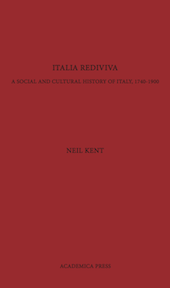Italia Rediviva: A Social and Cultural History of Italy, 1740-1900
Cambridge University
 This book seeks to provide a readable history, rich in both anecdotes and statistics, for students and a wide reading public who are interested in Italy in a period of history which - while it has been widely examined with respect to the Risorgimento as a positive and progressive movement which united Italy and enabled it to enter the modern world – has failed to consider Italy's multiplicity of cultures, art, architecture and societies. The period from 1750-1900, however, is neglected. This book rectifies the situation, examining the Catholic Church and its relationship to Jews, Protestants, Moslems, and the state; the relationship of urban areas to the countryside, with various regional dimensions; art, architecture, literature and music; famines, epidemics, health, and hygiene; the family, women, and sexual identity; war, peace, criminality, and the Mafia. Italia Redivia thus focuses on how Italians lived and interacted on a grass-roots level.
This book seeks to provide a readable history, rich in both anecdotes and statistics, for students and a wide reading public who are interested in Italy in a period of history which - while it has been widely examined with respect to the Risorgimento as a positive and progressive movement which united Italy and enabled it to enter the modern world – has failed to consider Italy's multiplicity of cultures, art, architecture and societies. The period from 1750-1900, however, is neglected. This book rectifies the situation, examining the Catholic Church and its relationship to Jews, Protestants, Moslems, and the state; the relationship of urban areas to the countryside, with various regional dimensions; art, architecture, literature and music; famines, epidemics, health, and hygiene; the family, women, and sexual identity; war, peace, criminality, and the Mafia. Italia Redivia thus focuses on how Italians lived and interacted on a grass-roots level.
Rather than considering the Risorgimento and Italy's national unification as THE defining event of the period, this work provides an alternative focus, rejecting sweeping conclusions in favor of a more nuanced analysis in which the regional societies, religious communities, local cultures and economic activities that informed the Italian peninsula from 1750-1900 are set against a complex background of conflict and cooperation, at a time of growing industrialization, secularism, and economic competition, which witnessed the rise of an independent Kingdom of Naples to the assassination of King Umberto I.
ACADEMICA PRESS
1727 Massachusetts Avenue, NW, Suite 507
Washington, DC 20036
academicapress.editorial@gmail.com
